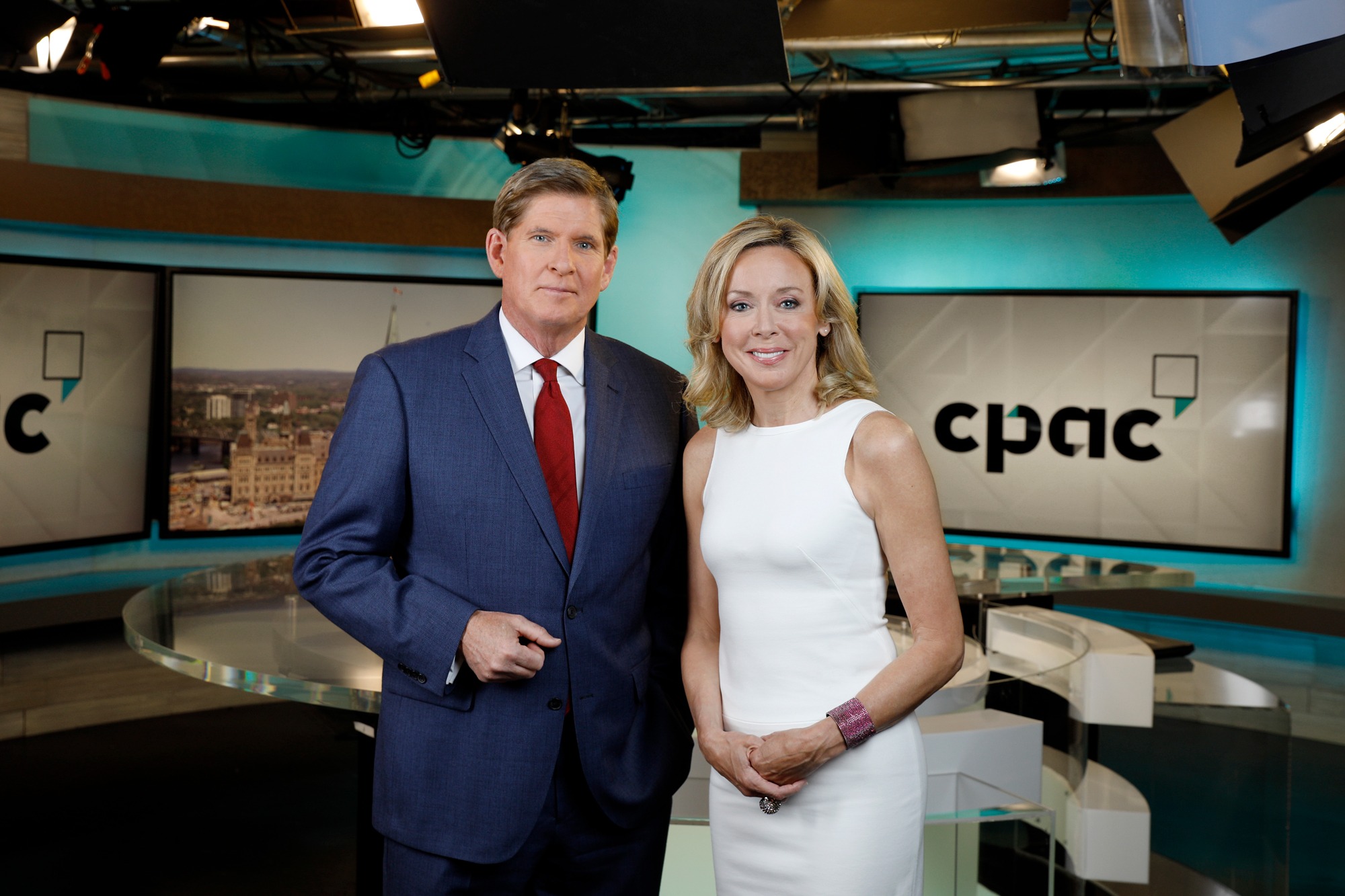CPAC turns 30 and the Retirement of its “Heart and Soul”—Peter Van Dusen

L. Ian MacDonald
October 27, 2022
The year 2022 marks the 30th anniversary of CPAC, the Cable Public Affairs Channel. In truth, it was for years essentially a Parliamentary video service, featuring Question Period, committees and the like.
It wasn’t until the arrival of Peter Van Dusen nearly a decade later in 2001 that it was transformed into a network of record, covering breaking news, political conventions, commissions of inquiry and press conferences competitively with the mainstream media.
This was not by accident but by Van Dusen’s design as CPAC’s executive producer, anchor and host of the channel’s nightly PrimeTime Politics.
In an ironic historical footnote of which Peter is well aware, it was his father, Tom Van Dusen, who was part of the advisory group that put Parliamentary proceedings on the air in 1977 in the first place. Though he was an adviser to three Conservative prime ministers—John Diefenbaker, Joe Clark and Brian Mulroney—Tom also worked across the aisle when the Liberals were in office. He did so as a staffer to Allan J. MacEachen, deputy prime minister and House leader under then-prime minister Pierre Trudeau. In Washington, House and Senate leaders, looking to televise Congress, sent envoys to Ottawa to see how it was done. Roger Mudd, then a star at CBS News, came to the Centre Block to do a story on it.
And Tom used to delight in telling the story in the family. I know this because, as friends are aware, I belong to that family, having married into it. Peter, a long-time friend, was the emcee at my wedding to his sister Lisa, youngest of that remarkable Ottawa cohort of seven news media hands and comms advisers. Tom was the family patriarch who lived to be 90 until his death in 2011, and the matriarch was the celebrated Ottawa landscape and portrait artist Shirley Van Dusen, still painting at the age of 96. As she has said herself, she has now “outlived the Queen,” born in the same year of 1926. And Grace, our daughter, is now online media editor of Policy Magazine.
If you wanted to overhear a good family argument on a Sunday afternoon, all you had to do was drive out to Russell, half an hour southeast of town off the 417, and stop by the Van Dusen homestead on the banks of the mighty Castor River. Tom loved nothing more than inciting family feuds among his offspring, with uncounted grandchildren running in and out of the room.
“It was Question Period with no Speaker,” Peter said. “Or a talk show with no depth. Or UFC Fight Night. Always a good argument, but everyone stayed friends.”

For years, the perception of CPAC as the Parliamentary channel was such that most viewers assumed it was a branch of the CBC, as it had been until CBC cut its funding as part of a federal budget cut in 1991. In fact, it has never received a nickel of public funding since, and today employs more than 300 people in its office of the 17th floor of the World Exchange Plaza overlooking Parliament Hill at 45 O’Connor Street in the heart of mid-town Ottawa.
The reason is that as a condition of its licence from the Canadian Radio-Television and Telecommunications Commission (CRTC), CPAC is “a must carry” on cable channels. Owned by a consortium of companies, including Rogers and Videotron, it is now available in 10 million homes across the country.
That rule may be a regulatory fiat, but it is Peter Van Dusen’s drive that has created a network of record, not unlike C-SPAN in the US, thanks to the vision of its CEO Susan Swain and her colleagues in Washington.
“Just as much credit must go to Peter for what he has done for CPAC,” says Christa Dickenson, the former head of Telefilm Canada and the CTV News Channel who arrived at CPAC in September as its new president and CEO, succeeding Colette Watson who as head of operations had wooed Van Dusen into his lead editorial role in 2001.
“You put us on the map, Peter,” Watson told him Wednesday evening. “You were everything to CPAC, and CPAC owes you everything.”
The context was a celebration of Van Dusen’s career on the occasion of his “retirement” at the age of 64. The venue was the Brasserie Métropolitain, “the Met,” the preferred gathering place of Ottawa’s political class in the Parliamentary Precinct. And they were out in force, from media pundits to pols of all parties.
And here’s the thing about PrimeTime Politics, to which I can attest as a former occasional guest. It was never about Peter, he didn’t have “TV head.” It was always about the story, and giving his guests the opportunity to tell it as they understood it. It was all he cared about. And if there was spin, he knew it simply went with the territory, and let the viewers decide for themselves. As Colette Watson put it, he was “the conscience of CPAC, and the heart and soul” of the place.
“He’s been the rock for CPAC, he’s solid like an oak tree.” says Catherine Cano, who was president and general manager from 2015 to 2019, having moved over from Radio-Canada where she was news director. “One of the reasons is his capacity to be objective. He looks at issues 360 degrees, from every angle. You could really count on his professionalism. He’s fiable, reliable. As a viewer, you trust him.”
It was never about Peter, he didn’t have “TV head.” It was always about the story, and giving his guests the opportunity to tell it as they understood it. It was all he cared about.
Van Dusen said some of that was the result of how he met Anna Senovic, 38 years ago, “completely by accident.”
As a reporter at CTV’s local CJOH television station, he was covering a convocation address at Carleton University where it happened that she was graduating with a master’s degree in French. They weren’t introduced and didn’t meet. But he was thunderstruck by her appearance and sent a note asking her out on a blind date. She ignored it, but he persisted until she finally agreed.
He said if he wasn’t “afraid to ask out of the blue a stranger to go out on a date,” he later found that it “influenced everything I do.” After that, he explained, no one could tell him what could and couldn’t be done, notably at CPAC.
He has spent more than 45 years in journalism, having begun as a teenage copy aide at Canadian Press in Ottawa, and going on to roles as a local reporter and then anchor for CTV and CBC.
Christa Dickenson, 51, offers her own sense of it as someone who has spent 30 years in broadcast management, including a stint as a young employee of CPAC. “As he says goodbye to our viewers,” she says, “CPAC has never been as relevant.”
She adds: “Everyone is looking for that contextual sense. And that’s what you’ll find at CPAC.” That’s increasingly pertinent as mainstream media are under constant attack from cheap shot artists and thugs on social media.
Dickenson also points to the recent Quebec election campaign where there were two French debates, and that “CPAC was the one place where interested viewers could find them entirely translated into English.”
But Dickenson is also nurturing a division of roles at the top, with CPAC’s new executive producer Nicolle Arams. “She’s a francophone from Saskatchewan,” Dickenson says, adding that she’ll bring a different regional perspective to the job.
As for French-language anchor Esther Begin, at 58, Dickensen says “she really brings a francophone viewpoint, primarily on Quebec, and for Esther the coverage is primarily a conversation. ‘Votre reference’ is our new tagline in French.” Indeed, “Conversations” and “L’Essential” are the names of her two shows.
“She’s a star,” says Cano, “a brilliant journalist, exactly the same as Peter.”
And Bégin says Van Dusen deserves great credit for “the movement for the evolution of CPAC” in French. “He has always been very respectful of the francophone duality of Canada. It’s very formidable.”
For Van Dusen, that comes from the seven kids growing up in Aylmer, across the Ottawa river in what is now part of Gatineau, and going to school in French.
“The greatest gift my parents gave us as kids,” he says, “was to send us to French school from the first grade.”
Looking ahead on a financial note, Dickenson allows she has no sense on whether CPAC will be eligible, along with other networks, to receive additional funding from Ottawa under Bill C-18, the draft Online News Act that would pump hundreds of millions of dollars into traditional media, notably CBC/Radio-Canada, which would be the biggest recipient of all. So far, not a word, or a penny, for CPAC.
“Certainly, we would not say no,” Dickenson allows.
Stay tuned.
As for Peter Van Dusen’s retirement activities, he is threatening to take up some serious golf, and will continue as a guitarist and lead singer of The 20th Century Boys, a charity fund raising band. And he favoured the guests Wednesday with a new and hilarious tune summing up his CPAC years.
But his signature song might as well be the Tina Turner classic—“Simply the Best.”
L. Ian MacDonald is Editor and Publisher of Policy Magazine.
